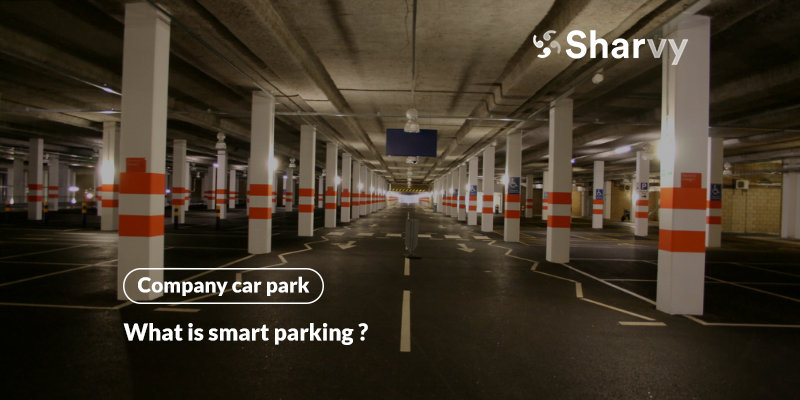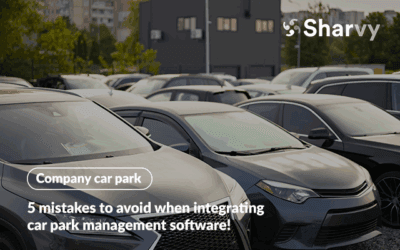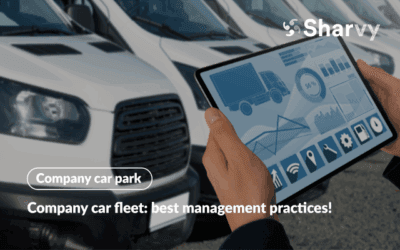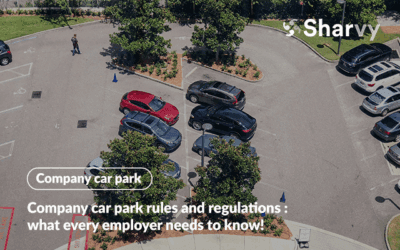You’ve probably heard of “smart parking” or “intelligent parking”. But what exactly do these expressions mean? And how can you effectively manage your company car park to achieve this?
Before going any further, it’s worth remembering that company car parks are one of the most unexploited issues regarding smart cities. That’s why some companies and start-ups are tackling these parking problems. They are doing so by offering innovative, connected solutions. Focus on this article.
What is a smart parking?
When it comes to company car parks, there are many different ways of organizing them. Some companies opt for fairly traditional management of their car parks : only a few people, particularly managers, have access and/or a majority of named spaces, which employees cannot use, even if the car park holder is absent. Therefore, this type of management needs to be more flexible, often leading to problems with occupancy rates or frustration among employees needing access to the car park. With the growth in hybrid working and teleworking, people rarely are in the office daily, so they don’t use their allocated parking space 100% of the time.
Conversely, some companies manage their car parks more flexibly. When this is fully optimized, we talk about smart parking. It’s no longer just a place to park but offers various services to facilitate access and parking. In this way, it promotes what is known as smart mobility. New technologies such as artificial intelligence and connected objects play a significant role in this approach. They enable the car park to optimize its occupancy and simplify its management : on-site sensors, automatic barrier opening, on-site guidance, number plate reading, automatic reservation and allocation of spaces, etc.
These innovations will gradually give us new mobility habits. The result? A new, more flexible, and more efficient mobility ecosystem.
Some tips for intelligent management of your company car park
As you will have understood, smart parking allows an optimised management and normally a better occupancy rate. And when it comes to company car parks, the key to profitability is to have an occupancy rate close to 100%. The person in charge of the car park must also make this task as time-consuming as possible, in particular with the help of dedicated software. When we talk about smart parking, we often think of a connected place. Here are some areas to explore to improve this management and make it more efficient :
1. Sharing places among employees
Gone are the days when only managers had access to the car park and owned their own named spaces. The idea is to allow everyone who needs to park to do so. But it’s also about breaking down the developed hierarchies over time. Companies now want to move, step by step, towards greater flexibility in the workplace and offer more integrated, intelligent, and, above all, shared solutions. The company car park is the first example of this.
Of course, some people can keep a designated seat, in particular senior managers and members of Comex. However, when these people are away from the office, their hearts must be available for other employees. To do this, the company can opt for a dedicated solution that makes it easy to reserve available seats.
2. Having a tool for the reservation of car park spaces
The task of distributing parking spaces can quickly become complex if employees can make their requests by email, telephone and other channels. Having a software that centralises all requests saves a lot of time to the person in charge of that task. Tools such as Sharvy make it easier to reserve parking spaces and thus the company car park management.
3. Securing your access control
Many companies still have a guard at the car park entrance or manage access with a badge. However, this is a significant issue for the security of the building and the company. Effective access control should authorize access only to people who can park in the car park or have a reservation on the day (employees & temporary visitors). But badges can be exchanged, so this is not a secure solution.
The best option is a number plate recognition camera. The camera at the entrance automatically opens the barrier only to vehicles pre-registered and authorized to enter the car park on the day. At the same time, the list of authorized number plates is transferred to the camera regularly, so access control is smoother and more secure.
Are you curious to know which access control solutions are best suited to the characteristics of your company car park? Read our white paper and discover our advice!
4. Informing the employee about the car park thanks to connected objects
To keep a car park organised, it is important that everyone finds their space easily, parks in a space suitable for their vehicle (electric, PRM, two-wheeled, etc) and does not clutter up the aisles while waiting for a space to become available, for example. To achieve this, a LED and sensor system can be set up to facilitate knowledge of the available spaces and their type. Thus, PRM spaces can be easily identified by a different colour from the others, for example, and red or green lights will indicate whether a space is occupied or not.
5. Make payments easier with smart parking
Smart parking systems often incorporate electronic payment functions, eliminating the need for cash transactions.
This move towards electronic payment systems is part of a quest for efficiency, transparency, and adaptation to contemporary financial management standards. There are many reasons why smart car parks are making payments more manageable.
The most obvious? The electronic payment systems in smart car parks enable transactions to be precisely traceable. Each payment is recorded electronically, facilitating administrative management and providing users with a transparent history of their parking expenditures.
In conclusion
There are several crucial aspects to the importance of smart parking. Firstly, this system is a clever response to the growing challenges of urban congestion, simplifying the search for parking spaces and contributing to more fluid and efficient urban mobility.
At the same time, the traceability of the data generated by smart car parks enables finer management of resources, anticipating fluctuations in demand and promoting optimum use of available spaces. This ability to adapt dynamically is essential in a constantly changing urban context!
A question? Check the following FAQ!
How can a smart parking system improve the management of parking spaces in a company?
A smart parking system enhances the management of parking spaces by optimizing occupancy and reducing user frustrations through solutions like connected sensors and automatic reservation systems. These solutions enable dynamic allocation of parking spaces, adjusting in real-time to the needs of drivers. Additionally, secure access control and real-time information on available spaces contribute to a smoother and more efficient user experience, while also increasing the overall efficiency of the parking facility.
Want to learn more? Check out our latest articles!
5 mistakes to avoid when integrating car park management software!
What are the 5 most common mistakes to avoid before and during the integration of parking management software? Focus!
Company car fleet: best management practices!
Should you electrify, pool or automate your company car fleet? What are the best management practices? Let’s take a closer look!
Company car park rules and regulations: what every employer needs to know!
Discover the essential company car park rules and regulations in the UK and ensure your business stays safe, accessible, and compliant.
Subscribe to our newsletter!
PARKING & WORKPLACE MANAGEMENT SOLUTION
Car park management - Charging points monitoring - Desk booking - Booking by time slots
SUBSCRIBE TO THE NEWSLETTER
Receive the latest Parking & Workplace trends by email once a month.













